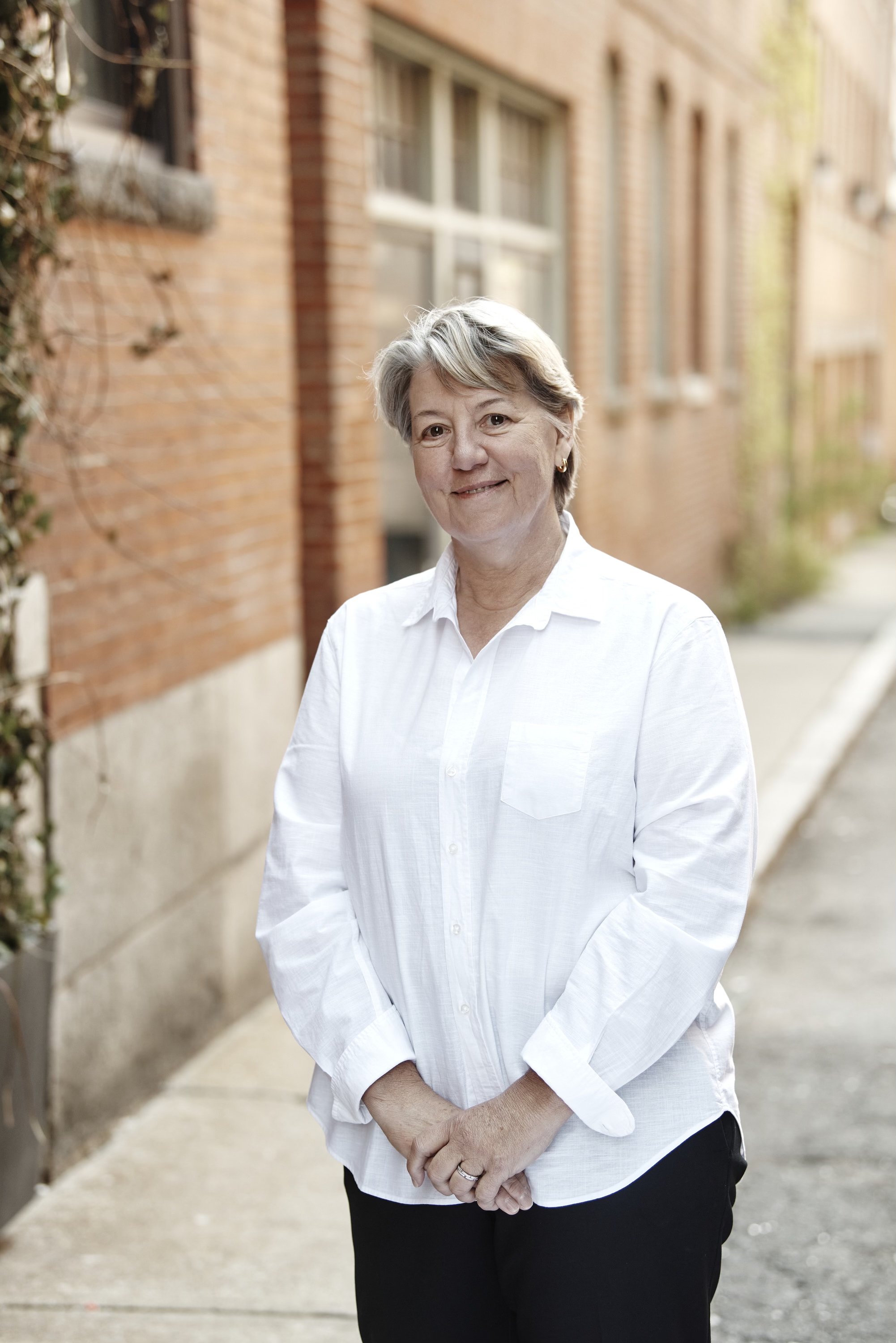ODS S1:E8 Julie Rhoad
Listen on Spotify | Listen on Apple Podcasts | Listen on Audacity (Coming soon)
Julie Rhoad
Former President and CEO of The NAMES Project
& AIDS Memorial Quilt
This episode features Julie Rhoad, the former president and CEO of the NAMES Project Foundation, which serves as caretaker of the AIDS Memorial Quilt, an ever-evolving memorial to lives lost to HIV/AIDS. Julie led the Foundation during its tenure in Atlanta, connecting Southeastern communities with The Quilt’s powerful stories of love and remembrance. She secured the long-term preservation of the AIDS Quilt by establishing the Library of Congress and the National AIDS Memorial as the permanent homes for the memorial and its priceless archival material.
Julie’s oral history was recorded by Morna Gerrard, lead archivist for the Women, Gender, & Sexuality Collection at Georgia State’s University Archives, she is included in the podcast episode to provide additional context.
Out Down South is brought to you by the Atlanta LGBTQ+ History Project and is part of the WUSSY Podcast Network.
Hosted by Rachel Garbus (@goodgraciousrachel) and Sam Landis (@iam_samlandis).
Produced by Sam Landis, Rachel Garbus, & Jon Dean (@jondeanphoto), .
Episode 8 was edited by Jonathan Thomas Maiocco (@jonathanthomasmaiocco)
Podcast graphics and branding created by Sam Landis
Photographer: Alex Pirtle (@photoescapades).
Julie is pictured in front of a panel of The AIDS Quilt in permanent display at The Atlanta History Center.
Project graphic design & social support: Amanda Killian
Project interns - Alyssa Zhang, Alex Campo, Hunter Buchheit, Kaleb Branch, and Oli Turner.
Our Original Podcast Theme Music was created by our sound designer, Jonathan Thomas Maiocco (@jonathanthomasmaiocco)
The podcast is funded by a Georgia Humanities grant and individual gifts from LGBTQ+ history lovers like you. If you would like to support the project, you can by visiting: atlantalgbtqhistoryproject.org/donate
Stay up to date with the Out Down South Podcast and Atlanta LGBTQ+ History Project on social: instagram.com/atllgbtqhisproj/ or @atllgbtqhisproj on Facebook, Twitter, or LinkedIn.
Show Notes & Additional Photos
The AIDS Memorial Quilt
The Quilt & Project History
The AIDS quilt project was launched in 1985 by the human rights activist and author Cleve Jones. Jones was living in San Francisco and was leading yearly candlelight marches in honor of Harvey Milk, San Francisco’s first openly-gay official, and Mayor George Mosconee, who were assassinated in 1978 by their colleague Dan White. While planning the 1985 memorial march, Jones learned over 1,000 San Franciscans had died in the growing AIDS epidemic. During that march, he handed out placards and asked marchers to write the names of loved ones who had died of the disease. When Jones and other organizers taped these placards to the walls of the San Francisco federal building, they realized the wall of names resembled a patchwork quilt–and the idea for the AIDS quilt was born.
Cleve Jones in 1987. Photograph: Liz Hafalia/San Francisco Chronicle/Hearst Newspapers/Getty Images
Jones gathered a group of friends who had all lost loved ones to AIDS, and that group became the foundation for the NAMES project AIDS memorial quilt. Cleve made the first quilt panel to honor his friend Marvin Feldman, and in 1987, he partnered with Mike Smith, Gert McMullin and several others to formally organize the NAMES Project Foundation. The project grew quickly: People heard about the quilt and began sending in panels in memory of their own lost friends and family members. Volunteers donated sewing equipment and helped others sew their panels.
The Inaugural display of The Quilt in Washington D.C. in October 1987
On October 11, 1987, Jones and his group took the Quilt to Washington, DC, and displayed the nearly 2,000 panels on the National Mall, during the National March on Washington for Lesbian and Gay Rights. Laid out on the grass, the giant quilt was larger than a football field. At sunrise that day, volunteers ceremonially unfolded the Quilt sections, while people read aloud all 1,920 names of the people represented in The Quilt. The reading of names has become a tradition that accompanies most Quilt displays.
Since then, the Quilt has traveled all over the country and the world. Cleve Jones, Mike Smith and the NAMES Project Foundation were nominated for a Nobel Peace Prize, and in 1992, President Bill Clinton invited people to march in his inauguration parade carrying segments of the quilt. The last time the Quilt was laid out on the Mall, in 1996, it had grown to 390,000 panels.
Bill and Hillary Clinton Viewing the Quilt. Creator: Jamal Wilson | Credit: AFP/Getty Images
“I remember when Hillary and I walked on the Mall [in Washington, D.C.] to see the AIDS Quilt. We walked back and forth to see all the squares, and we were looking for people that we knew. It was a personally emotional thing, seeing the love and devotion that those sections of the quilt represented for all those people who died prematurely, and knowing that now, with medicine, they didn't have to die anymore, if we did the right things.
It was a very emotional day.”
Bill Clinton
(In a 2001 Interview with Frontline)
In 2000, The NAMES Project Board of Directors decided to relocate the Foundation's national headquarters from San Francisco to Atlanta in response to the evolving landscape of HIV/AIDS. This move aimed to foster the Foundation's growth in partnerships, programs, and financial resources. It was during this time, that Julie Rhoad became The NAMES Project & AIDS Memorial Quilt CEO & President.
“Cleve Jones wanted the Quilt to be a weapon. A weapon that said, “we are going to break the barriers of stigma; we’re going to fight homophobia.” In ’87, bearing witness to that display was a remarkable moment.
Two thousand panels of the AIDS Memorial Quilt arrived on the National Mall where they were not welcome, and they provided visual evidence that [these people] were actually loved by moms and dads, by heterosexuals no less.”
Julie Rhoad, August 12, 2019
In 2004, over 8,000 of the most recent panels received since October 1996 were exhibited on The Eclipse in Washington, D.C., marking National HIV Testing Day.
In 2012, commemorating the 25th anniversary of the NAMES Project Foundation, the Quilt made its return to Washington, DC, in collaboration with the Smithsonian Museum's American Folklife Festival. The entire Quilt was showcased on the National Mall over a two-week period, featuring 1,500 blocks of panels daily. Due to its size, the Quilt can no longer be displayed in its entirety at once on the Mall. The International AIDS Conference, which followed the exhibition, prominently featured the Quilt across more than 60 locations in the D.C. metro area.
In 2013, in continued efforts to raise awareness and educate, a special Quilt initiative called "Call My Name" was established to spotlight HIV/AIDS in the Black community and the ongoing public health crisis. This program seeks to increase the number of Quilt panels reflecting the impact of HIV/AIDS within the Black community and address the role of stigma and prejudice in rising infection rates. A national tour ensued, including panel-making workshops organized by Black churches and community groups, aiming to raise awareness of the HIV/AIDS crisis in the African American community. Some of the stories honoring Black lives lost to AIDS through Quilt panels were featured in a compelling online exhibition during Black History Month 2020.
Source: aidsmemorial.org/quilt-history







Additional Resources:
Georgia State University, Out In The Archives | The AIDS Memorial Quilt:
exhibits.library.gsu.edu/out-in-the-archives/hiv-aids/the-names-project-memorial-quilt/
National AIDS Memorial | The History of The Quilt:
aidsmemorial.org/quilt-history
About the Project:
The Atlanta LGBTQ+ History Project is a multimedia initiative to gather, share, and preserve the history and life stories of LGBTQ+ communities in Georgia and across the Southeast. Through oral history, photography, and archival materials, we bring the voices and stories of LGBTQ+ Atlantans to life.
Explore the project through museum exhibitions, the Out Down South podcast, live and virtual panel series, and online materials. All project materials are archived at Georgia State University Library’s Special Collection & Archives. Find out more at
Learn more by visiting: atlantalgbtqhistoryproject.org
We are grateful for the partners of the podcast and project: WussyMag, The LGBTQ Institute at The National Center for Civil and Human Rights, and the special collections and archives at Georgia State University Library where all of the oral histories from this project will be archived.
Want to record your own oral history, or interview a friend or family member?
StoryCorps is an organization that provides people across the country with the opportunity to record and preserve the stories of their lives. You can record an interview with a friend or family member at their Atlanta recording booth, or remotely through the StoryCorps app. Find out more here: storycorps.org/atlanta/
You can also reach out to us at hello@atlantalgbtqhistoryproject.org to nominate others you think we should include in the
Partner recognition:
We are grateful for the partners of the podcast and project: WussyMag, Out Front Theatre Company, and the special collections and archives at Georgia State University Library where all of the oral histories from this project will be archived.
A full episode transcript to be uploaded at a later date.


















